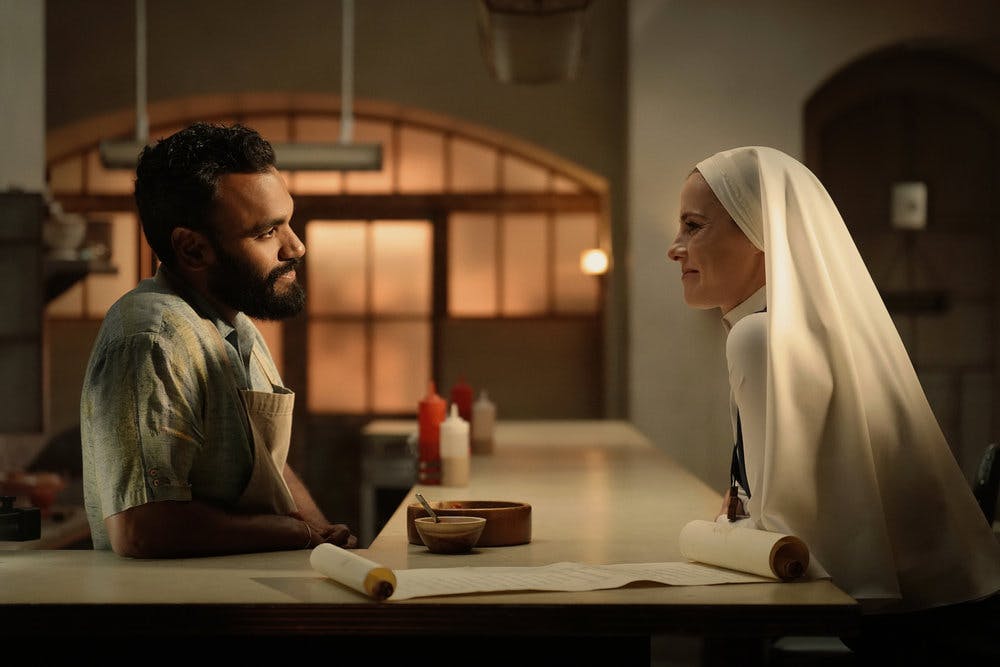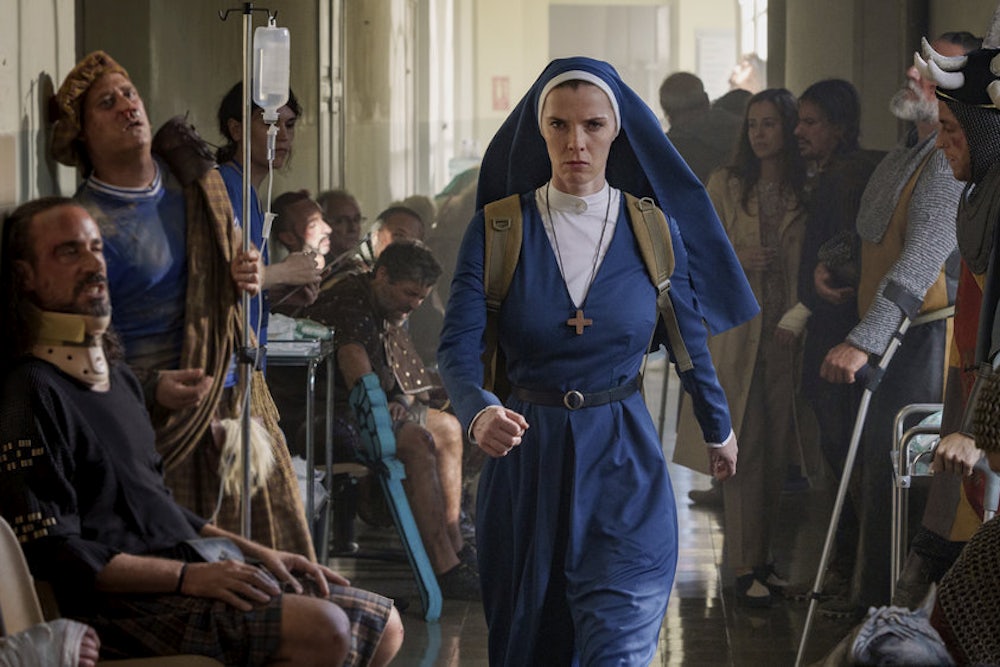In a recent Time article, artificial intelligence theorist Eliezer Yudkowsky wrote, “Many researchers steeped in these issues, including myself, expect that the most likely result of building a superhumanly smart AI, under anything remotely like the current circumstances, is that literally everyone on Earth will die.” Sounds bad! Yudkowsky advocates, in his op-ed, a total shutdown of AI development and implies that it cannot restart until all parties involved formulate a firm “alignment” plan, according to which any future AI can be designed with particular, human-specified goals in mind and not, just, you know, to see what it can do.
For Yudkowsky, the emergence of advanced AI is a major, global problem that needs to be stopped immediately. For the tech mogul signees of a recent open letter from the Future of Life Institute—including Elon Musk—the development just needs to be slowed down while they figure out and implement, I don’t know, a complex, ironclad ethics of artificial intelligence. Either way, according to these prophets of doom, the cognitive ability of AI technology is quickly outstripping our ability to imagine that technology. As you might imagine, then, unimaginable things might well occur.
On one hand, this all seems like relatively responsible rhetoric, an industry checking its own hubris. On the other hand, we might read this rhetoric as itself hubristic. As the computational linguistics scholar Emily M. Bender has pointed out, scaremongering letters and op-eds like these function less as earnest warnings about an uncertain future and more as advertisements for tech firms. Using a clever bit of reverse psychology, they fret openly about the risks of the ultrapowerful intelligences they are creating as a way to hype just how ultrapowerful they think the intelligences they’re creating might be. Under the guise of a warning, they offer a carnival barker’s pitch.
While Bender and her colleagues Timnit Gebru, Angelina McMillan-Major, and Margaret Mitchell are not worried about the machines at OpenAI coming to life and waging war upon a helpless humanity, they are worried about how this type of tech-fantasist storytelling is getting in the way of addressing the emerging AI industry’s actual problems, present and future. As tech-optimists and tech-pessimists debate which sci-fi script will play itself out in the coming years, even “ethically” developed AI systems will still promulgate the same old social problems we have now: worker exploitation, large-scale data theft, synthetic media that reproduces systems of oppression, and, of course, the concentration of power in the hands of the tech CEOs and investors currently playing Victor Frankenstein on the internet. AI hype skeptics like Bender are not worried about the AI, in other words; they’re worried about the people.
Mrs. Davis, Peacock’s new AI dramedy—co-created by Tara Hernandez and Damon Lindelof—is also rather worried about the people. In the alternate universe of Mrs. Davis, all famine, poverty, and war have—apparently—been ended by the emergence of a ubiquitous, all-knowing, seemingly benevolent algorithm that speaks to nearly everyone in the world through a Bluetooth earpiece. “Mrs. Davis,” as American users have named the algorithm, has learned as much as is available about everything on Earth and, mostly, figured it out for us. As long as all her users follow her instructions—sometimes they even speak on her behalf as “proxies”—everything will be better than fine. The algorithm has, for all intents and purposes, optimized existence.
The danger is that its users lose their autonomy, or any desire for it. Mrs. Davis operates through a social media app in which human users perform tasks in order to earn “wings,” which show up if you look through the augmented reality interface on your screen. Some of the people we meet are happy to play along, aspiring toward this virtual trophy; others are willing to quite literally sell their souls for it.
This is not a particularly new vision of AI. Its benefits are well in line with the clichés of tech-optimists; its potential risks are well in line with the clichés of the tech-pessimists. Mrs. Davis, the algorithm, is likely a vision of AI that, to some extent or another, you’ve seen before. Mrs. Davis, the streaming series, however, is something you have certainly not seen before. This show is a slapstick action-adventure, an earnest, strangely sexy religious romance, a cheeky nunsploitation shoot-’em-up, an unvarnished meditation on grief and loss, and a ’70s-style paranoid thriller. The show is gut-wrenchingly profound one moment and gut-bustingly stupid the next, sometimes within the space of a single scene. It’s hard to come up with something new to say about AI, some future that hasn’t already been imagined so fully that it’s become an unconscious norm even for the people working to build new AI systems; it’s just as hard to come up with something new to put on TV. And yet, there has never been anything quite like Mrs. Davis.
Our heroine is Sister Simone (Betty Gilpin), a young nun with a variety of scars both literal and figurative, who rides around the outskirts of Reno, Nevada, on horseback and militantly resists the lure of Mrs. Davis. She, alone, refuses to name the algorithm. Partially because of a complicated past trauma, and partially because of her ethical stance, she understands that act of naming, of anthropomorphizing, to be the great sin of the era. It’s not just the sacrilege of granting personhood to a computer—Simone is a nun, after all—but that such an act represents a collapse of the stories we tell to understand the world itself.
Reality, to Simone, is precious. As we learn, she grew up the child of a chintzy casino magician, and she performed a role in his show every night, pretending to be a random audience member, performing a simple sleight-of-hand trick to delight the crowd. But after every performance, her father would come to pick her up, and the act would end. To conflate the trick—the performance that augments reality, tells a cunningly false story about it—with reality itself was to lose something essential. Within the world of the trick, Simone is just some random girl in the audience, but outside the trick, Simone is a talented girl with a flawed father who loves her. If the trick never ends, if the world materially transforms into the false story we tell about it, then Simone is always anonymous, always alone.
To accept Mrs. Davis—as nearly everyone in the series does, from Simone’s mother superior to the pope to, eventually, Simone herself—is to succumb to a world full of ease and contentment but absent both that grounding presence and the possibility of transcendence. It is a universe whose disbelief is permanently suspended and thus a world in which you can’t really believe in anything. Every meaningful experience in this optimized world is a fake, a fiction, an act of immersive theater. Maybe that’s true anyway, but Simone thinks there’s something else, too.
The figure for this “something else” on the show is, well, Jesus Christ. Not the idea of Jesus, the actual guy (who in the show goes simply by “Jay”). There are a lot of potential spoilers for this zany show, and the more surprised you are by them, the better, but this particular one—revealed in episode two—seems important to the work Hernandez and Lindelof are up to in this series. In Spike Jonze’s AI romance Her, Joaquin Phoenix forms a stunted and awkward erotic relationship with his AI companion; in Mrs. Davis, Simone forms a weirdly hot (if I’m being honest) erotic relationship with Jesus.

The simple analysis here would be to say that belief in the utopian potential of AI is akin to religious faith—in this case, sincerely held belief in Christian redemption. And that’s certainly a part of how Mrs. Davis works, but it also oversimplifies the show’s actual critique. Faith in God and faith in the algorithm are not diametrically opposed, and the algorithm unquestionably improves the lives of many of its users. But its virtues are shadows, its contentment is too uncomplicated, its utopia is not born of the muck of existence, but rather built haphazardly on top of it. Loving Mrs. Davis is easy; loving Jesus is hard.
On this show, the algorithm is disembodied. It is all-knowing, but immaterial. It needs its human users—“proxies”—to speak and act on its behalf. These human proxies act as if their own labor is merely a function of the algorithm. When a random man uses a giant magnifying glass to explode a truck full of strawberry jam and bankrupt Simone’s abbey, it’s an act that’s deeply freighted with longing—he wants those wings!—but also surreally detached from the world around him. In the pursuit of those virtual tokens, social life in the meatspace becomes cheap, transactional, unreal. Again, maybe that’s always been true, but the show insists that that cannot be all.
A common critique of religion is, of course, that it, too, is a fiction. If AI is a story we tell ourselves, religion is the greatest story we ever told. But, in this show, religion has something that AI doesn’t. It’s sensual, physical, even kind of horny. Simone and Jesus making out in a diner; the nuns all gathered together in rowdy, funny, feminist communion; a bloody sword fight with the Knights Templar; the spine-tingling sensation of prayers desperately offered and immediately answered; the actual Holy Grail—Simone’s religion is a flesh and blood and guts human thing.
And flesh and blood is where the show is headed. Early in the series, Simone agrees to a sit-down with Mrs. Davis—in the algorithm’s archly manipulative way, it sets the scene in Simone’s elementary school classroom, with a kindergarten teacher as proxy—and makes a deal. The algorithm will shut itself down if Simone locates and destroys (wait for it) the Holy Grail. Simone agrees, and much of the series follows her on this quest, submitting to the algorithm in order to destroy it. Along the way, she’s alternately aided and flummoxed by her ex-cowboy ex-boyfriend, his radical anti-AI terrorist cell, a group of bickering German kidnappers straight out of The Big Lebowski, a surly Roman baker, the Knights Templar, the apostate pope, and various other weirdos. It’s the oldest story in the book.
One of the hallmarks of recent Lindelof productions—The Leftovers and Watchmen, specifically—is their ability to pivot deftly between moments of jarring, funny warmth and human insight and moments of horrendous and unbearable grief. Mrs. Davis has taken that formula and replaced the “moments of horrendous and unbearable grief” with It’s a Mad, Mad, Mad, Mad World–style madcap high jinks. One moment, she is sharing a drink with her mother superior (Margo Martindale) in the stables, and the next she is jam-spattered, pursuing the magnifying glass guy in a high-speed chase through the desert. None of this high-wire act would work without Gilpin’s almost athletic ability to sustain both tones at once, to be both hilarious and gutting, to infuse every moment of desperate prayer or laughable farce with deep, human gravitas. It is a startling, stunning performance.
I first learned about Eliezer Yudkowsky not because of his apocalyptic warning about AI, but because of a tweet of his that was making the rounds. “Any jobs that require mediocre essays can now, *in real life*, be done with ChatGPT assistance,” he wrote. “Students who use ChatGPT to generate essays are *realistically* showing they can handle the mediocre-essay-writing jobs for which modern universities are vigorously training them.” One of the most vexing aspects of tech prophecy in the present moment is its contempt for art, whether it’s writing or the kind of image-making that’s supposed to be replaced by tools like DALL-E. Art, in the eyes of lots of these kinds of futurists, is not a mystery, but a problem to be solved. That the creative act is difficult to perform, difficult to explain, difficult even to understand makes it an uncomfortably irreducible remainder to someone who’s trying, Mrs. Davis–style, to optimize the world. And so, of course, AI’s makers come for it first, seeking at long last to reveal the trick at the center of art, the proof that the idea of romantic genius and inspiration is a glib illusion, a grift meant to shame and embarrass everyone who can’t draw or dance or write a good sentence.
Mrs. Davis, whatever else it has to say about artificial intelligence or God or strawberry jam, is a statement, too, about art. ChatGPT can mimic, and it can synthesize, and it can give us a good-enough simulacrum of those “mediocre” essays for “mediocre” purposes. But watching Mrs. Davis is the kind of experience—baffling, hilarious, raw—that reminds you of what it feels like to see something genuinely, dangerously new.
I don’t know which one of the hundreds of AI prophets currently populating the internet is right about what the future of AI portends, but I do know that their prophecies seem pretty familiar. Did the guy who got suspended from Google because he insisted the company’s AI had developed a soul come to believe that because the machine convinced him or because he’d read that sort of thing in a Philip K. Dick novel? Was the New York Times reporter who got spooked by the chatbot that told him it wanted to be alive primed to hear it because he’d watched Her? Did the chatbots know to speak in those terms because they had read those books and seen those movies? Eliezer Yudkowsky’s warnings are scary, but so, too, is The Terminator, a film that has the exact same concerns about AI alignment that he does. I haven’t seen anybody imagine anything like the world of Mrs. Davis. And, God, that tells us something.






